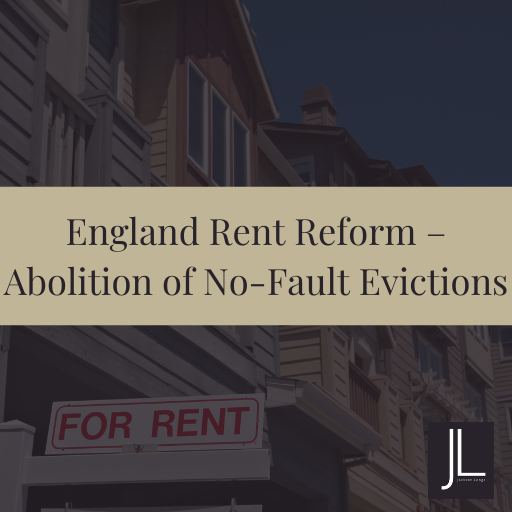
On 17th May 2023, the UK government revealed plans to abolish “no-fault” evictions in England as a step towards offering increased protections for renters. The Renters’ (Reform) Bill arrives three and a half years after the Government’s election manifesto promised to terminate such practices.
Section 21’s, also known as no-fault evictions, currently allows landlords to regain control over their properties from tenants without stating a particular reason. This has led to extensive disapproval from housing advocacy groups, who contended that it exposes renters to unjust and random evictions, resulting in unstable and uncertain living conditions.
The Renters’ (Reform) Bill seeks to address these concerns by mandating that landlords present valid reasons for eviction, such as unpaid rent, property damage or breaches of the tenancy agreement. This move towards a more equitable system aims to provide tenants with enhanced stability in their homes whilst still enabling landlords to safeguard their interests.
The announcement comes shortly after updates to other areas of property law, including reform to ground rent in February 2022. Find out more in this article.
What does this reform mean for landlords and tenants?
This reform is set to reshape the private rental industry in England. With this, landlords and tenants must adapt to a new legal framework that catalyses fairness and stability for all involved.
As part of the bill, the Government will also bring forward the following legislation:
- Decent Homes Standard will be implemented within the private rented sector for the first time, meaning renters will have safer, higher quality homes in the hope of removing the blight of poor-quality homes in local communities. This coincides with the Government’s ‘levelling up’ mission to halve the number of non-decent rented homes by 2030.
- Blanket bans on renting to tenants who receive benefits, or those with children, will become illegal for landlords and agents, meaning no family will be unjustly discriminated against when property searching.
- Enforcement powers for councils will be increased, and it will be mandatory for councils to report on this enforcement activity in order to help target criminal landlords.
- Tenants will have the legal right to request a pet in their home. The landlord must consider this and can not unreasonably refuse. Furthermore, landlords can require pet insurance to cover property damage where pets live.
Government Viewpoint
Housing Secretary Michael Gove said:
“Too many renters are living in damp, unsafe, cold homes, powerless to put things right, and with the threat of sudden eviction hanging over them.
This Government is determined to tackle these injustices by offering a New Deal to those living in the Private Rented Sector; one with quality, affordability, and fairness at its heart.
Our new laws introduced to Parliament today will support the vast majority of responsible landlords who provide quality homes to their tenants, while delivering our manifesto commitment to abolish Section 21 ‘no-fault’ evictions.
This will ensure that everyone can live somewhere which is decent, safe and secure – a place they’re truly proud to call home.”
Landlord and Tenant Solicitor Richmond
Keeping up to date with housing law developments is crucial for both landlords and tenants. Our skilled solicitors are committed to guiding clients through these intricacies and safeguarding their rights.
For more information, please get in touch with Jackson Longe Solicitors today on 0203 332 2069 or email info@jacksonlonge.com.